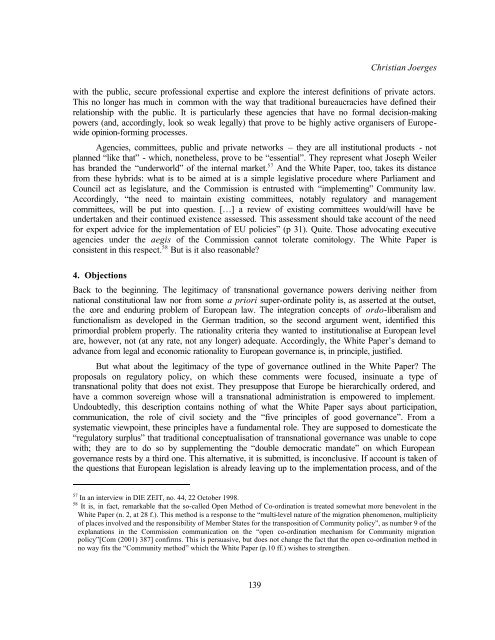Mountain or Molehill ?: - European University Institute
Mountain or Molehill ?: - European University Institute
Mountain or Molehill ?: - European University Institute
You also want an ePaper? Increase the reach of your titles
YUMPU automatically turns print PDFs into web optimized ePapers that Google loves.
139<br />
Christian Joerges<br />
with the public, secure professional expertise and expl<strong>or</strong>e the interest definitions of private act<strong>or</strong>s.<br />
This no longer has much in common with the way that traditional bureaucracies have defined their<br />
relationship with the public. It is particularly these agencies that have no f<strong>or</strong>mal decision-making<br />
powers (and, acc<strong>or</strong>dingly, look so weak legally) that prove to be highly active <strong>or</strong>ganisers of Europewide<br />
opinion-f<strong>or</strong>ming processes.<br />
Agencies, committees, public and private netw<strong>or</strong>ks – they are all institutional products - not<br />
planned “like that” - which, nonetheless, prove to be “essential”. They represent what Joseph Weiler<br />
has branded the “underw<strong>or</strong>ld” of the internal market. 57 And the White Paper, too, takes its distance<br />
from these hybrids: what is to be aimed at is a simple legislative procedure where Parliament and<br />
Council act as legislature, and the Commission is entrusted with “implementing” Community law.<br />
Acc<strong>or</strong>dingly, “the need to maintain existing committees, notably regulat<strong>or</strong>y and management<br />
committees, will be put into question. […] a review of existing committees would/will have be<br />
undertaken and their continued existence assessed. This assessment should take account of the need<br />
f<strong>or</strong> expert advice f<strong>or</strong> the implementation of EU policies” (p 31). Quite. Those advocating executive<br />
agencies under the aegis of the Commission cannot tolerate comitology. The White Paper is<br />
consistent in this respect. 58 But is it also reasonable?<br />
4. Objections<br />
Back to the beginning. The legitimacy of transnational governance powers deriving neither from<br />
national constitutional law n<strong>or</strong> from some a pri<strong>or</strong>i super-<strong>or</strong>dinate polity is, as asserted at the outset,<br />
the c<strong>or</strong>e and enduring problem of <strong>European</strong> law. The integration concepts of <strong>or</strong>do-liberalism and<br />
functionalism as developed in the German tradition, so the second argument went, identified this<br />
prim<strong>or</strong>dial problem properly. The rationality criteria they wanted to institutionalise at <strong>European</strong> level<br />
are, however, not (at any rate, not any longer) adequate. Acc<strong>or</strong>dingly, the White Paper’s demand to<br />
advance from legal and economic rationality to <strong>European</strong> governance is, in principle, justified.<br />
But what about the legitimacy of the type of governance outlined in the White Paper? The<br />
proposals on regulat<strong>or</strong>y policy, on which these comments were focused, insinuate a type of<br />
transnational polity that does not exist. They presuppose that Europe be hierarchically <strong>or</strong>dered, and<br />
have a common sovereign whose will a transnational administration is empowered to implement.<br />
Undoubtedly, this description contains nothing of what the White Paper says about participation,<br />
communication, the role of civil society and the “five principles of good governance”. From a<br />
systematic viewpoint, these principles have a fundamental role. They are supposed to domesticate the<br />
“regulat<strong>or</strong>y surplus” that traditional conceptualisation of transnational governance was unable to cope<br />
with; they are to do so by supplementing the “double democratic mandate” on which <strong>European</strong><br />
governance rests by a third one. This alternative, it is submitted, is inconclusive. If account is taken of<br />
the questions that <strong>European</strong> legislation is already leaving up to the implementation process, and of the<br />
57 In an interview in DIE ZEIT, no. 44, 22 October 1998.<br />
58 It is, in fact, remarkable that the so-called Open Method of Co-<strong>or</strong>dination is treated somewhat m<strong>or</strong>e benevolent in the<br />
White Paper (n. 2, at 28 f.). This method is a response to the “multi-level nature of the migration phenomenon, multiplicity<br />
of places involved and the responsibility of Member States f<strong>or</strong> the transposition of Community policy”, as number 9 of the<br />
explanations in the Commission communication on the “open co-<strong>or</strong>dination mechanism f<strong>or</strong> Community migration<br />
policy”[Com (2001) 387] confirms. This is persuasive, but does not change the fact that the open co-<strong>or</strong>dination method in<br />
no way fits the “Community method” which the White Paper (p.10 ff.) wishes to strengthen.

















